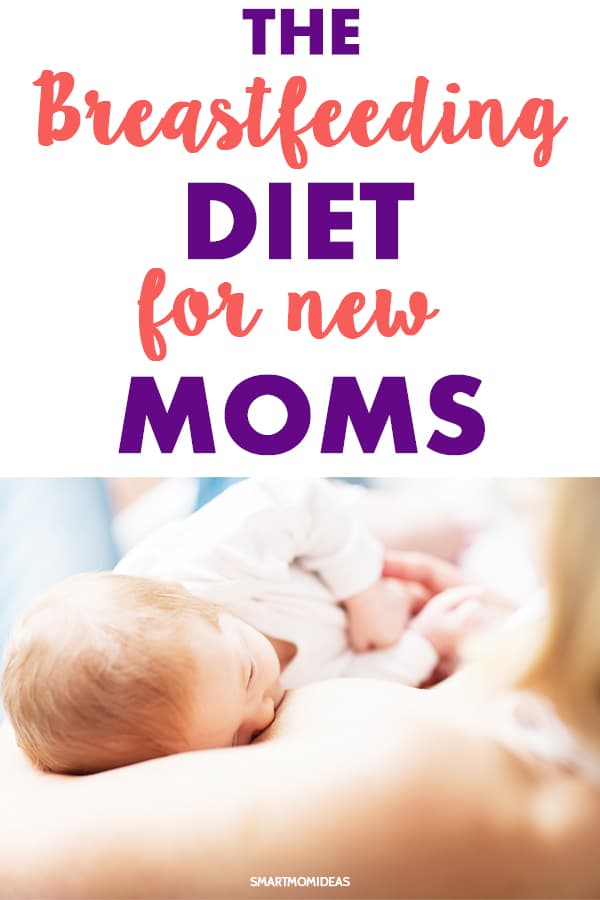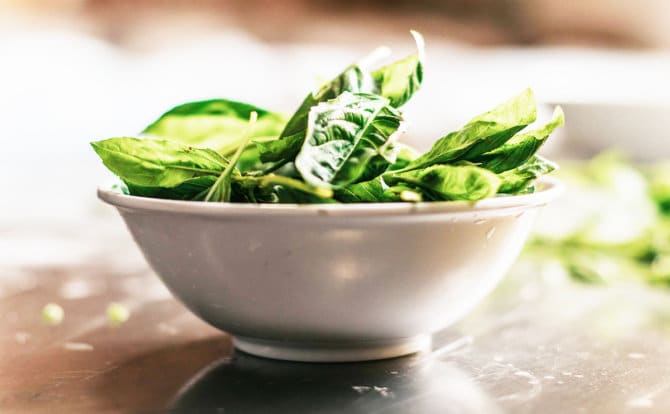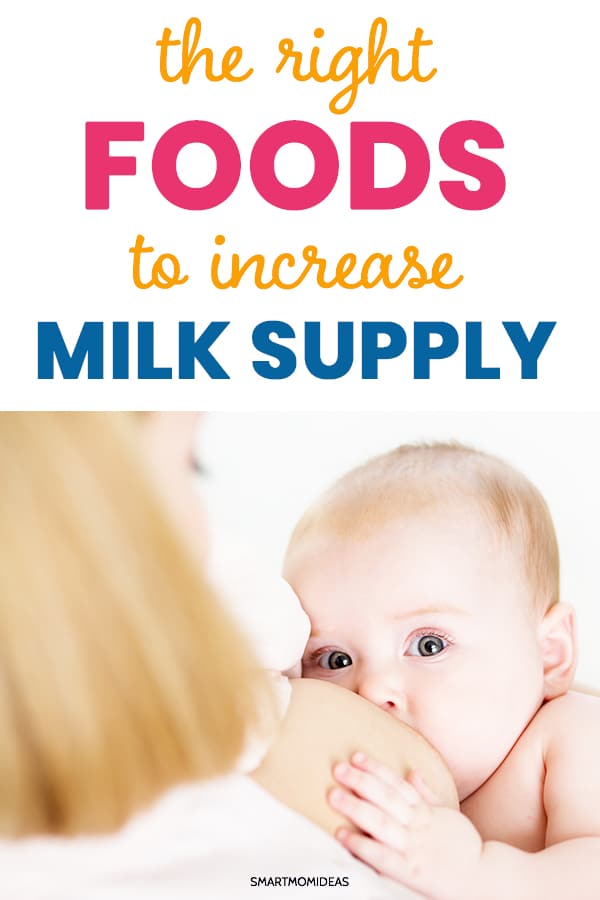Check out the breastfeeding diet for more milk supply!
Congrats if you’ve moved past the stages of helping your baby latch on properly and the (oh so painful!) boob engorgement, mama!

From there, breastfeeding really does become much more enjoyable.
I was fortunate to breastfeed my twins (supplemented) for over a year.
I struggled in the beginning but over time, breastfeeding one child at a time worked the best then breastfeeding both of them at the same time!
Learn what foods are best to eat while breastfeeding so that your baby will receive the most nutrients and benefits possible.
Follow the healthiest breastfeeding diet and give the gift of health to you and your baby that will last for the coming years.
Avocados
There are a lot of ways to eat avocado! They’re not only so incredibly yummy, but they’ll help you to feel full. Food is your fuel source and the demand for it is extremely high as you’re breastfeeding your little one.
Avocados are one of the easiest foods to incorporate into your diet because they don’t take long to prepare and serve with your meals and snacks.
Nutrition Source: Vitamin K, potassium, folate, vitamin C, vitamin E, and B vitamins
Nuts
Almonds are a great energy source and are sometimes recommended to include in moms diet to increase her milk supply. Yes, eating almonds helps with milk production!
They make for a healthy snack on the go or you can create a delicious smoothie using almond milk.
Almonds help reduce blood sugar levels, lower cholesterol, and help you to feel full longer.
Other nuts like walnuts can be eaten in your oatmeal or peanuts in healthy trail mix. Rather than grab the cheesy bag of chips you love, why not eat this instead?
It only takes a few seconds to add nuts to your meals. You can also pack them for snacks in your purse or diaper bag ahead of time, mama!
And if you haven’t tried almond butter yet, what are you waiting for?!
Nutrition Source: Zinc, calcium, iron, vitamin K and B vitamins, protein, and essential fatty acids.
Water

Breastfeeding takes it out of you! Literally…it leaves you so thirsty.
You need to make sure you’re staying hydrated.
Your breastmilk is made up of 90% water, and therefore drinking enough water is essential to supplying enough breast milk.
It’s even healthier if you add lemon!
Whole Grain Cereal
Eating a quick bowl of cereal will compliment your busy schedule since you may already be struggling just to find time to cook.
It’s always easier to grab for the simple foods we can eat in 5 minutes or less rather than waiting to eat 3 large meals per day. No matter how hard we try, motherhood busyness just takes over sometimes.
Eating whole grain cereal will help your digestive system function smoothly too!
Nutrition Source: Fiber, vitamin B, iron, folate, zinc, magnesium, and protein.
Brown Rice
The folic acid contained in brown rice is essential for your baby’s growth.
Nutrition Source: Folic acid, fiber, and iron.
Carrots
Carrot juice is golden when it comes to breastfeeding. Have a cup shortly before lunch and it may have a positive impact on your breastmilk supply.
Eating carrots or drinking carrot juice also improves eye health, lowers cholesterol, and aids in weight loss.
Nutrition Source: Beta-carotene and vitamin A.
Oatmeal
Oats contain B vitamins which help elevate your mood and combat depression, anxiety, and stress.
Oats are also believed to help improve breast milk production.
Nutrition Source: Protein, vitamins, and minerals including zinc, iron, manganese, and calcium.
Blueberries
Instead of reaching for the tub of ice cream, get a healthy fix of blueberries.
A blueberry smoothie is the perfect option when your hands are full, and you haven’t made dinner yet.
Especially since it’s both quick to make and filling.
Nutrition Source: Vitamin C, folate, potassium, and fiber.
Oranges
We all know that oranges are well-known (and appreciated!) for their vitamin C. Our bodies don’t make it, so you need to make sure you’re consuming it daily through the foods you eat.
Vitamin C supports the health of your bones and teeth. It’s also a great immunity booster (just what your baby needs during the first year of life)!
Nutrition Source: Vitamin C
Kale
Kale is king! Eating kale will help your body function optimally. It’s a nutrient dense food and helps reduce your cholesterol and your risk for a heart attack.
Try 10 delicious ways to eat more kale.
Nutrition Source: Vitamin A B1, B2, B6, vitamins C and E, copper, manganese, dietary fiber, potassium, iron, magnesium, omega-3 fatty acids.
Spinach

If eating salads doesn’t excite you, just remember the benefits for you and baby as you eat it long term. Keep in mind that spinach can be eaten in more ways than one. Salads is just one of them.
You can also eat spinach in stir fry, pasta, smoothies, in cooked dishes, or on sandwiches.
Let me list of a few of the health benefits:
- Promotes bone health
- Prevents asthma & cancer
- Lowers blood pressure
Nutrition Source: Vitamin K, vitamin A, folate. Cooked spinach allows you to absorb higher levels of vitamin A and vitamin E, protein, fiber, zinc, thiamin, calcium, iron, beta-carotene, and lutein.
Chia Seeds
Breastfeeding is a wonderful way to give your beautiful baby vital nutrients for growth and development. But it sure isn’t easy! It can leave you feeling hungry so much of the time.
Chia seeds are a superfood and worthy to be eaten! The great thing about chia seeds is the fact that they keep you feeling full.
Nutrition Source: Fiber, protein, calcium, magnesium, and omega-3 fatty acid.
Hemp Seeds
Hemp seeds have a variety of vitamins and minerals that are vital to your baby’s growth and development. And not to mention, good for your health too, mama!
Hemp seeds are a complete protein and are absolutely phenomenal as they support the brain, heart, and hormones.
They may be small seeds, but check out these amazing health benefits:
- Improves blood circulation
- Keeps you feeling full longer and reduces cravings
- Reduces the risk of blood clots
- Cleanses the colon (combats constipation!)
- Maintains skin health
Sounds too good to be true, right?
It’s not! Incorporate this into your diet regularly for you and baby to reap all those health benefits.
Nutrition Source: Protein, iron, fiber (soluble and insoluble) zinc, and omega-3 and 6.
Black Sesame Seeds
Sesame seeds are believed to help produce breast milk. You can consume either the seed or the sesame seed oil.
As with other forms of seeds you can eat them on toast, cook with them, or consume them through smoothies.
Nutrition Source: Calcium and omega-6 fatty acids.
Beans/ Legumes
Chickpea (also known as Garbanzo) beans are known for their lactogenic properties and are excellent because they’re really filling.
If you’re vegan or vegetarian, beans are a fantastic meat replacer!
Nutrition Source: Protein, fiber, and iron.
Tip: Gas is not fun! If you want the nutrients without the gas, here are a couple things you can do:
- Soak your beans in cool water for 8 hours (or overnight) before cooking. Pour out the soaking water, then rinse and drain thoroughly before cooking.
- Eat only one protein in the same meal.
- Avoid eating potatoes and beans in the same meal as it conflicts with digestion.
- Eat your beans with higher amounts of veggies and a whole grain. These aid the digestive process as opposed to hindering it.
Ginger
There are several ways to take ginger, including as tea! Just make sure to limit your intake to 2-3 cups daily!
Here are some of the benefits:
- Aids milk supply
- Reduces bloating
- Helps pass trapped gas (for you and baby)
- Increases immunity
Please note! If you lost a lot of blood during your delivery, avoid consuming ginger altogether.
Nutrition Source: Zinc, folate, vitamin B6, magnesium, riboflavin, niacon, and phosphorus.
Turmeric
Ever tried turmeric? Check out some of these amazing health benefits, mama!
- Aids in breastmilk production
- Boosts immunity (contains antiviral and antibacterial properties)
- Works as an antidepressant
- Promotes healing and digestion
- Improves blood circulation
You must make sure you’re consuming turmeric the right way so you can extract all the benefits.
Nutrition Source: Zinc, copper, calcium, iron, potassium, sodium, and phoshous.
Common Breastfeeding Questions
When starting a breastfeeding diet, you might be worried types of foods to avoid, how much food to eat and what to do if you have dietary restrictions.
Foods to Avoid While Breastfeeding
There are certain foods you should avoid consuming (or eat only in moderation) while breastfeeding.
- Alcohol
- Caffeine (in moderation). Limit to 2-3 cups per day.
- Fish (avoid high mercury amounts)
- Peppermint, parsely, and sage-(It doesn’t hurt baby, just reduces your milk supply)
- Allergy foods (for baby)– most commonly nuts, cow’s milk, egg, fish, and citrus. May cause a skin rash or irritability in your baby. Cut one food at a time to see where the problem is. Then wait at least 2 weeks. If no change, offer that food again and try cutting another food. Continue this until you find the culprit food.
How Can I Increase My Milk?

There’s good news for you, mama! Your breastfeeding experience does not have to be cut short because you’re not able to produce enough milk or your milk supply dries up altogether.
Besides consuming some of the above foods, you can also take fenugreek in tea or liquid form.
Fenugreek is an herb that can increase breastmilk supply within 24-72 hour after consumption.
Consult your doctor before doing so.
How Much Food Should I Be Eating?
Overall, there are some general guidelines to how much you should be eating. But it’s best to let your body indicate how much food you need. Every woman is different so it’s certainly not the same amount for everyone.
Generally, a breastfeeding mom should be eating about 500 more calories than she normally would. This averages out to be about 2,000-2,500 calories per day.
Also, if you’re not sure which vitamins and minerals are essential to the health of you and your baby, you can learn a bit more here.
How Do I Know If My Baby Is Getting Enough Milk?
Breastfeeding can bring about concerns for new and experienced mothers since it can be hard to tell if your baby is actually getting enough of your milk.
Here are some ways you can tell:
- Your baby is feeding at least 12 times within a 24 hour period
- There is less milk in your breasts (your breasts will feel softer and less full)
- Your baby is alert and aware when he or she is awake
- Your baby wakes on his or her own to feed
- Your baby looks a healthy color and is gaining weight
- You can see your baby swallows during feedings and you can hear a gulping sound as the milk goes down
- Your baby is pooping and peeing regularly
Will I Supply Enough Milk If I’m On a Vegan/ Vegetarian Diet?
If you have a vegan or vegetarian diet, it’s completely possible to produce enough breast milk for your baby’s feeding needs.
But here’s the thing. You need to remember that quality is better than quantity. A vegan or vegetarian diet consisting of primarily junk and processed foods can yield and steady flow of breastmilk.
However, you want to do more than just produce milk, mama. You want all the milk your baby receives to be rich in nutrients.
That said, make sure your food sources are providing you with adequate amounts of calcium, iron, zinc, protein, and vitamin B12 as well as other essential vitamins and minerals.
To Sum Up
There you have it, mama! I know it was a lot to take in. But trust me, you’re making the right decision as you strive to eat enough of the right foods.
Processed foods taste great going down, but we all have to pay the price (with our health) sooner or later.
I encourage you to get creative by finding new ways to eat these foods that are so rich in nutrients. It’s important to maintain a healthy breastfeeding diet so that your baby grows and develops well physically and mentally.
And this is good news! You (above any other person on the planet) has control over your baby’s health and nutrition during their early stages of life. Your eating healthy matters!
Over to you, mama! What breastfeeding foods did I miss in this list?
Good luck with your breastfeeding diet mamas!
Don’t forget to pin me!






Leave a Reply